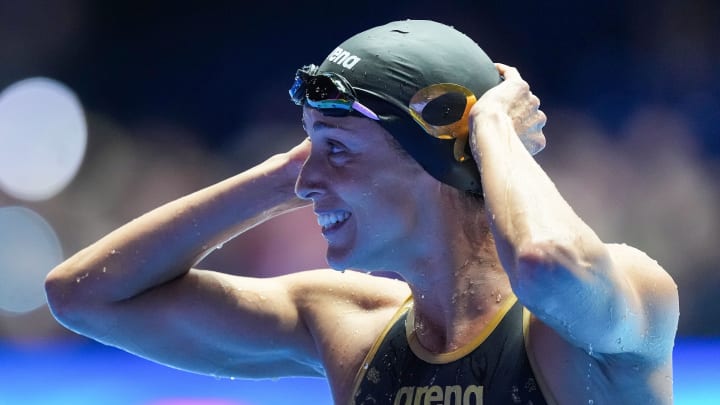The U.S. Olympic Swim Trials Produced a Torch Bearer for Every Middle-Age Athlete
Pat Forde

Sunday morning, Father’s Day, Matthew Rose knew where he needed to be. He drove by himself to his father’s grave in Aspen, Colo., pulled out his phone and watched his younger sister, Gabrielle, defy age and time, accompanied by the memory of Michael Rose.
“I was with Dad,” Matthew says.
Gabi, age 46 and competing in the U.S. Olympic Swimming Trials for the first time since 2004, swam a lifetime best of 1:08.43 in the 100-meter breaststroke. The oldest of more than 1,000 athletes swimming at Lucas Oil Stadium became the oldest semifinalist in U.S. Trials history, delighting a crowd of 17,697 with a shocking display that turned a young person’s sport upside down.
What a swim from Gabrielle Rose!
— USA Swimming (@USASwimming) June 16, 2024
The 46-year-old, who is the oldest competitor at #SwimTrials24, just won her 100m breaststroke heat in 1:08.43 and will advance to tonight's semifinals.@TeamUSA | 🎥: @NBCOlympics & @peacock pic.twitter.com/u7pKTY5Gsx
Michael Rose, former president of Holiday Inns Inc., who died of cancer in 2017, would have adored this surprise chapter in his daughter’s life. She was a two-time Olympian a lifetime ago, and somehow conjured up some of her old greatness.
“He would have gotten a total kick out of this,” Mathew Rose says. “He supported us and encouraged us in everything we did.”
Sunday night, after Gabi swam yet another lifetime best of 1:08.32 to finish 10th—not quite fast enough to make the eight-woman final—her proud smile mingled with a rush of emotion. She was thrilled to have her 9-year-old daughter, Annie, watching in the stands. But she missed who wasn’t there.
“Father’s Day,” she noted, voice breaking and tears welling up. “Yeah, he would have loved all of this.”
Gabi has carried on Mike Rose’s vision and passion with the Rose Foundation, which has invested in athletic facilities and educational opportunities in the family’s hometown of Memphis, Tenn., particularly aimed at benefiting at-risk populations in the city. After making the 1996 and 2000 Olympics, and competing at Trials in ‘04, high-level competitive swimming gradually became a side gig.
Living in Southern California, Gabi always stayed in superb shape but went in and out of swimming at the masters level (age-group races). She coaches at Alpha Aquatics, but had a breakthrough performance at Masters Nationals last spring, posting a lifetime best in the 100 breast. Given the calendar, with 2024 being an Olympic year, that triggered this mid-life dream.
As she posted faster and faster times, she passed them along to Matthew, who is an elite-level triathlon coach with Dynamo Multisport in Atlanta. He suspected something was up.
One Tuesday last July, after teaching a cycling class, Matthew asked Dynamo’s head swim coach, Ian Murray, what the breaststroke Olympic Trials qualifying times were. Gabi’s times were on track. “I think my sister is trying to make Trials,” he said.
He called Gabi and asked, “Are you trying to make Trials?”
“Yeah,” she said sheepishly. “I really want to make it.”
And so she did. But in a stroke that she had fallen out of touch with more than 30 years ago.
Gabi was a national age-group record holder in the 50 and 100 breaststroke at age 12. But as often happens with breaststrokers, things can change. Rhythm and tempo can disappear. Body changes can disrupt the stroke. She changed her emphases to individual medley, butterfly and freestyle, becoming an NCAA champion at Stanford and an Olympian for two nations—first utilizing her dual citizenship to make the Brazilian team in 1996, then the U.S. team in 2000.
When her breaststroke came back to her, she was ready to excel with newfound gifts of wisdom and perspective. “I’m kind of going back to that little girl who was disappointed and didn’t get to pursue that and wondered what happened to her breaststroke—I found it, just a couple decades later,” she said.
What’s it like being the oldest semifinal competitor EVER at Olympic trials? 🤯
— Masters Swimming (@MastersSwimming) June 16, 2024
Gabrielle Rose shares her experience after making the semifinals in the 100 breaststroke. Her journey started 14 months ago at USMS’s Spring Nationals.
She also has advice for all of the women out… pic.twitter.com/7Gypm5jthL
On the eve of this improbable Olympic Trials, Matthew sent her a long email Friday. He reminded her of her long and occasionally complex relationship with the sport, with swimming, with water itself.
“The water’s been patient with her,” he says. “This has been a long, non-linear journey. To go after something when you’ve got the wisdom and so much perspective, she can do this without the weight on her shoulders of any expectations. This is the happiest I’ve seen her in a long time.”
Never a threat to make the Olympic team—which only takes the top two qualifiers in each individual event—she was thrilled to be an exemplar of what is possible at an age when so many people aren’t even trying to do something great athletically.
“I’m really lucky to feel so young and so strong,” she said. “I don’t really relate to [the] oldest. I’m hoping to show people you can do more, you can have more energy, you can have more strength than you thought possible. I want women in particular to not be afraid to be strong, to lift weights, to take care of themselves.”
Gabi quickly became a fan favorite in Indy, getting enthusiastic ovations even when she was sharing the pool with home-state favorite and world-record holder Lilly King. Making the semifinals was a revelation. Nearly making the finals was the last celebration of something improbable—something Michael Rose would have absolutely loved.
“This was the cherry on top,” she said Sunday night. “Hearing the crowd, it was really, really a great experience. So many people have reached out. It’s been special feeling to be embraced by so many.
“I’m so proud of myself.”